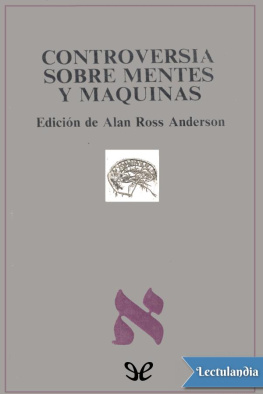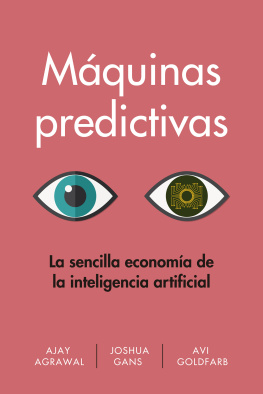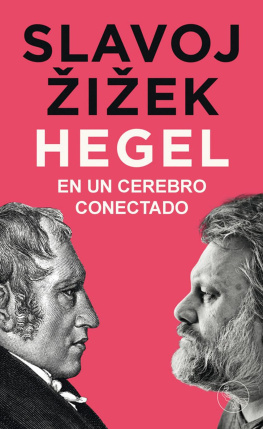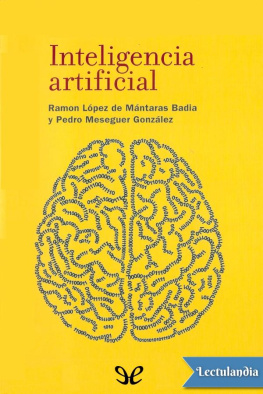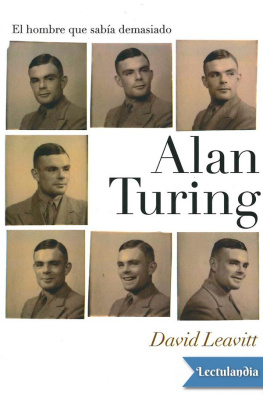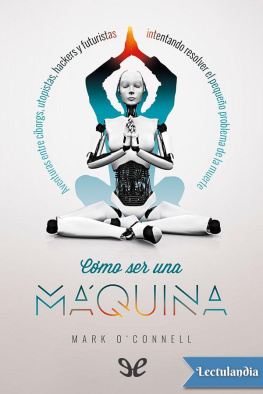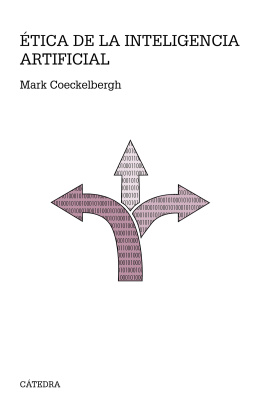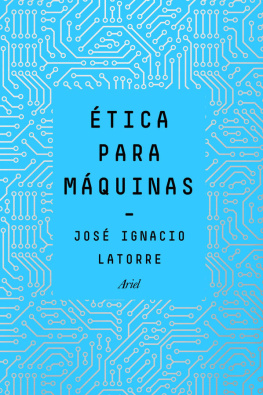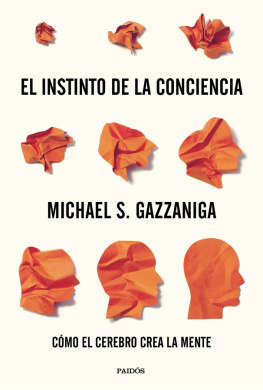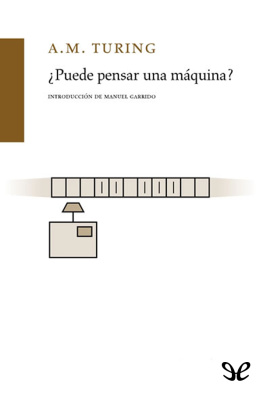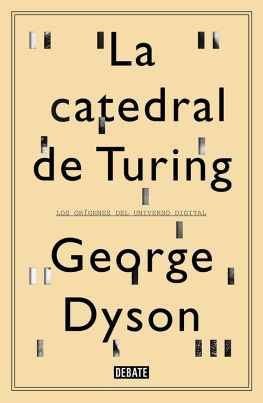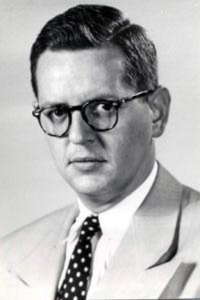
ALAN ROSS ANDERSON (1925-1973), fue un lógico estadounidense y profesor de filosofía en las universidades de Yale y Pittsburgh en los Estados Unidos de América.
Obras: Some nasty problems in the formal logic of ethics. Nous I(4): 345-60, 1967; Entailment: The Logic of Relevance and Necessity. Vol. 1. Princeton: Princeton Univ. Press, 1975; Entailment: The Logic of Relevance and Necessity. Vol. 2. Princeton: Princeton Univ. Press, 1992.
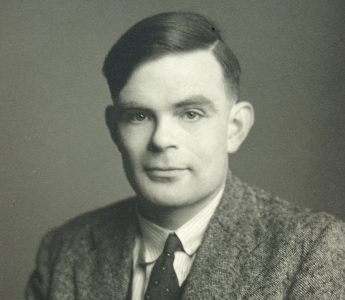
ALAN TURING (23 de junio de 1912-7 de junio de 1954), fue un matemático, lógico, informático teórico, criptógrafo, filósofo, biólogo teórico, maratoniano y corredor de ultradistancia británico. Es considerado uno de los padres de la ciencia de la computación y precursor de la informática moderna.
Obras: Alan Turing, On computable numbers, with an application to the Entscheidungsproblem, Proceedings of the London Mathematical Society, Series 2, 42 (1936); Intelligent Machinery (1948); Computing Machinery and Intelligence (1950).
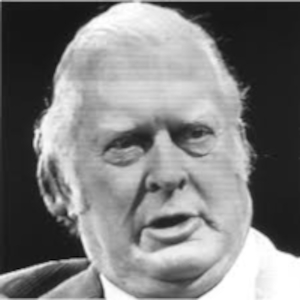
MICHAEL SCRIVEN (Gran Bretaña, 1928) es un académico estadounidense, titulado en matemática y doctorado en filosofía.
Obras: The foundations of science and the concepts of psychology and psychoanalysis. Minnesota Studies in the Philosophy of Science, 1956; Concepts, theories, and the mind-body problem. Minnesota Studies in the Philosophy of Science, Vol. 2, 1958; Scientific explanation, space, and time. Minnesota Studies in the Philosophy of Science, Vol. 3. , 1962; Computers and comprehension. RAND monograph, 1964; Applied logic: An introduction to scientific method. Behavioral Research Laboratories, 1965; Primary philosophy. McGraw-Hill, 1966; Morality. Social Science Education Consortium, 1966; Perspectives of Curriculum Evaluation. American Educational Research Association Monograph Series on Curriculum Evaluation, Vol. 1, 1967; Evaluation Thesaurus. Sage, 1991.

JOHN RANDOLPH LUCAS FBA (18 de junio de 1929 – 5 de abril de 2020)fue un filósofo británico.
Obras: Principles of Politics, 1966; The Concept of Probability, 1970; The Freedom of the Will, 1970; The Nature of Mind 1972; A Treatise on Time and Space, 1973; Essays on Freedom and Grace, 1976; Space, Time and Causality, 1985; Conceptual Roots of Mathematics, 1999.

KEITH R. GUNDERSON (1935 – octubre 14 de 2003) fue un filósofo estadounidense y profesor de la Universidad de Minnesota durante 40 años.
Obras: Language, mind, and knowledge, 1975; Mentality and Machines, 1985.
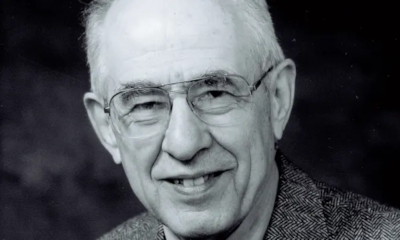
HILARY WHITEHALL PUTNAM (Chicago, Illinois, Estados Unidos, 31 de julio de 1926 - Arlington, Massachusetts, Estados Unidos, 13 de marzo de 2016) fue un filósofo, matemático e informático teórico estadounidense.
Obras: Racionalidad y metafísica, 1985; Razón, verdad e historia, 1988; Representación y realidad: Un balance crítico de funcionalismo, 1990; Mente, lenguaje y realidad, 2012; Ética sin ontología, 2013.
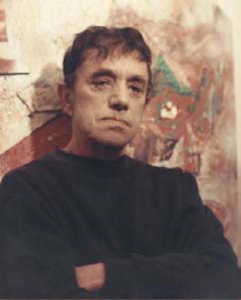
(ROBERT) PAUL ZIFF (22 de octubre de 1920, New York, Estados Unidos – 9 de enero de 2003, Chapel Hill, North Carolina) fue un artista y filósofo estadounidense especializado en semántica y estética.
Obras: Art and the Object of Art, 1951; The Task of Defining a Work of Art, 1953; Reasons in Art Criticism, 1958; About Behaviourism, 1958; The Feelings of Robots, 1959; On What a Painting Represents, 1960; Semantic Analysis, 1960; On Understanding Understanding Utterances, 1964; The Simplicity of Other Minds, 1965; On H.P. Grice’s Account of Meaning, 1967.
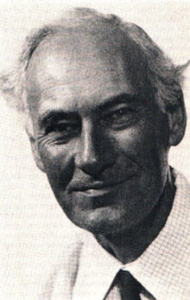
JOHN JAMIESON CARSWELL “JACK” SMART citado como J. J. Smart (16 de septiembre de 1920 – 6 de octubre de 2012) fue un filósofo australiano de origen británico.
Obras: An Outline of a System of Utilitarian Ethics, 1961; Philosophy and Scientific Realism, 1963; Problems of Space and Time, 1964; Between Science and Philosophy: An Introduction to the Philosophy of Science, 1968; Utilitarianism : For and Against, 1973; Ethics, Persuasion and Truth, 1984; Essays Metaphysical and Moral, 1987; Atheism and Theism, 1996.
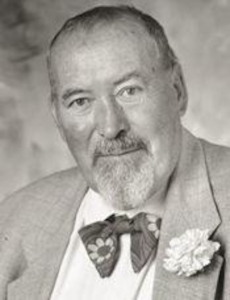
RODERICK NINIAN SMART (6 de mayo de 1927, Cambridge, Reino Unido – 29 de enero de 2001, Lancaster, Reino Unido) fue un filósofo británico.
Obras: Reasons and Faiths: An Investigation of Religious Discourse, Christian and non-Christian, 1958; World Religions: A Dialogue, 1960; Secular Education and the Logic of Religion, 1968; Historical Selections In the Philosophy of Religion, 1962; Worldviews: Crosscultural Explorations of Human Belief, 1981.
Bibliografía
Se incluye todo el aparato bibliográfico que acompañaba los artículos recopilados en este libro (junto con el lugar y fecha de la edition original). Se citan también otros artículos de interés, aunque no hemos pretendido reunir una lista exhaustiva de libros y artículos sobre el tema «Mentes y maquinas», debido en parte a limitaciones de espacio, pero principalmente, porque ya existen excelentes bibliografías: Armener, Minsky (en particular su Bibliography to the Literature on Artificial Intelligence), o Simmons and Simmons.
Anisimov, S. F., Man and Machine (Philosophical Problems of Cybernetics), Report No. JPRS 1990-N. Washington, D.C.: Joint Publications Research Service, 1959.
Armer, Paul, Attitudes Toward Intelligent Machines. Santa Monica, cal.: The RAND Corporation, 1962.
Ashby, W. R., «Can a Mechanical Chess Player Outplay Its Designer?» British Journal for the Philosophy of Science, Vol. Ill (1952), 44-47.
—, Design for a Brain. Nueva York: John Wiley & Sons, Inc., 1954.
Blake, D. V. and A. M. Uttley, eds., Proceedings of a Symposium on Mechanization of Thought Processes, 2 vols. Londres: Her Majesty’s Stationery Office, 1959.
Burks, Arthur W., «Computation, Behavior, and Structure in Fixed and Growing Automata», Behavioral Science, Vol. VI, No. 1 (1961), 5-22.
Butler, Samuel, Erewhon. Caps. 23-25.
Carnap, Rudolf, «The Interpretation of Physics», en Readings in the Philosophy of Science, H. Feigl y M. Brodbeck, eds., pp. 309-318. Nueva York: Appleton-Century-Crofts, Inc., 1953.
—, «The Methodological Character of Theoretical Concepts», en Foundations of Science and the Concepts of Psychology and Psychoanalysis,

